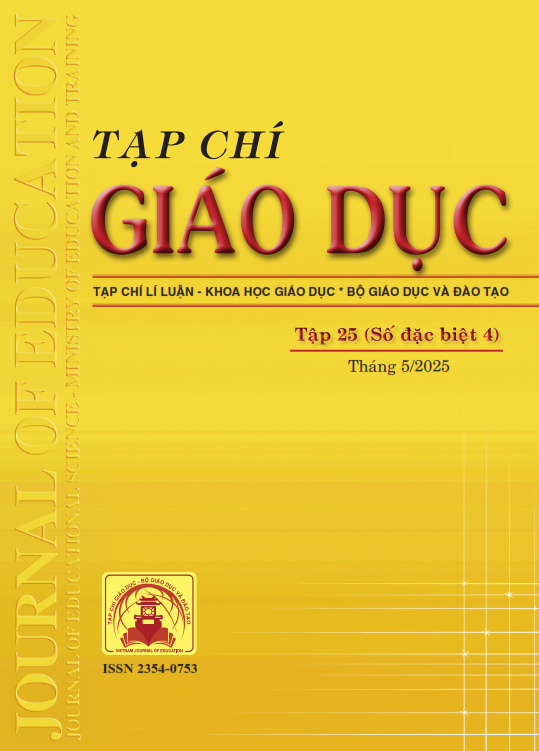Vai trò của siêu nhận thức đối với giáo viên trong dạy học ứng dụng công nghệ
Tóm tắt
The integration of technology into teaching is an essential trend, but its effectiveness largely depends on teachers' competencies. Among these, metacognition plays a crucial role in utilizing technology to support teaching and learning. This study examines the role of metacognition in teachers’ technology-assisted instruction through theoretical frameworks such as TPACK, PTK, and beliefs about teaching with technology. The findings indicate that metacognition enables teachers to assess their and their students' technological abilities, determine appropriate operational procedures, select suitable technologies for instructional content, and decide on the optimal timing and duration of technology use. Furthermore, metacognition supports teachers in lesson planning, monitoring, and adjusting instructional activities. Based on these findings, the study recommends that teachers be trained and enhance their metacognitive skills to optimize teaching with technology, thereby contributing to improve education quality in the context of educational innovation and digital transformation.
Tài liệu tham khảo
Abuan, M. I., Herrera, D. J., & Herrera, M. L. (2024). Metacognitive Model of the Science Teachers’ TPACK in Butuan City, Caraga Philippines. International Journal of Research and Innovation In Social Science (IJRISS), VIII(IIIS), 382-403. https://dx.doi.org/10.47772/IJRISS.2024.803026S
Cao Thị Hà, Nguyễn Văn Thanh (2014). Kĩ năng siêu nhận thức - Những vấn đề lí luận và khả năng vận dụng vào quá trình dạy học Toán. Tạp chí Giáo dục, 329, 51-53.
Flavell, J. H. (1976). Metacognitive aspects of problem solving. In The nature of intelligence (pp. 231-236). Routledge.
Hoàng Thị Ngà (2017). Nghiên cứu bước đầu về siêu nhận thức và những khả năng ứng dụng trong dạy học. Tạp chí Giáo dục, số đặc biệt kì 2 tháng 8, 147-151.
Hota, C. P., V.Asanambigai, & Lakshmi, D. (2023). Metacognition-Driven Approach to Enhance Computer Programming Skills: A Multi-Criteria Decision Making Analysis. Journal of Propulsion Technology, 44(4), 2039-2045.
Joshpine, T., & Albina, A. P. (2023). Influence of metacognitive awareness on Technological Pedagogical and Content Knowledge (TPACK) among preservice teachers. Education and Information Technologies, 28, 14553-14576. https://doi.org/https://doi.org/10.1007/s10639-023-11764-y
Lê Bình Dương, Nguyễn Thị Hậu (2020). Dạy học xác suất thống kê theo hướng rèn luyện kĩ năng siêu nhận thức cho sinh viên ở các trường đại học. Tạp chí Giáo dục, 472, 50-54; 7.
Mishra, P., & Koehler, M. J. (2006). Technological pedagogical content knowledge: A framework for teacher knowledge. Teachers College Record, 108(6), 1017-1054.
Teng, M. F. (2023). Metacognition. Trong R. S. Z. Wen, Cognitive Individual Differences in Second Language Acquisition: Theories, Assessment and Pedagogy (pp. 175-199). De Gruyter.
Thomas, M. O., & Palmer, J. M. (2014). Teaching with Digital Technology: Obstacles and Opportunities. The Mathematics Teacher in the Digital Era, 71-89.
Thurm, D., & Barzel, B. (2022). Teaching mathematics with technology: A multidimensional analysis of teacher beliefs. Educational Studies in Mathematics, 109(1), 41-63.
Trouche, L. (1998). The Complex Process of Converting Tools into Mathematical Instruments: The Case of Calculators. International Journal of Computers for Mathematical Learning, 3, 195-227.
Đã Xuất bản
Cách trích dẫn
Số
Chuyên mục
Giấy phép

Tác phẩm này được cấp phép theo Ghi nhận tác giả của Creative Commons Giấy phép quốc tế 4.0 .












